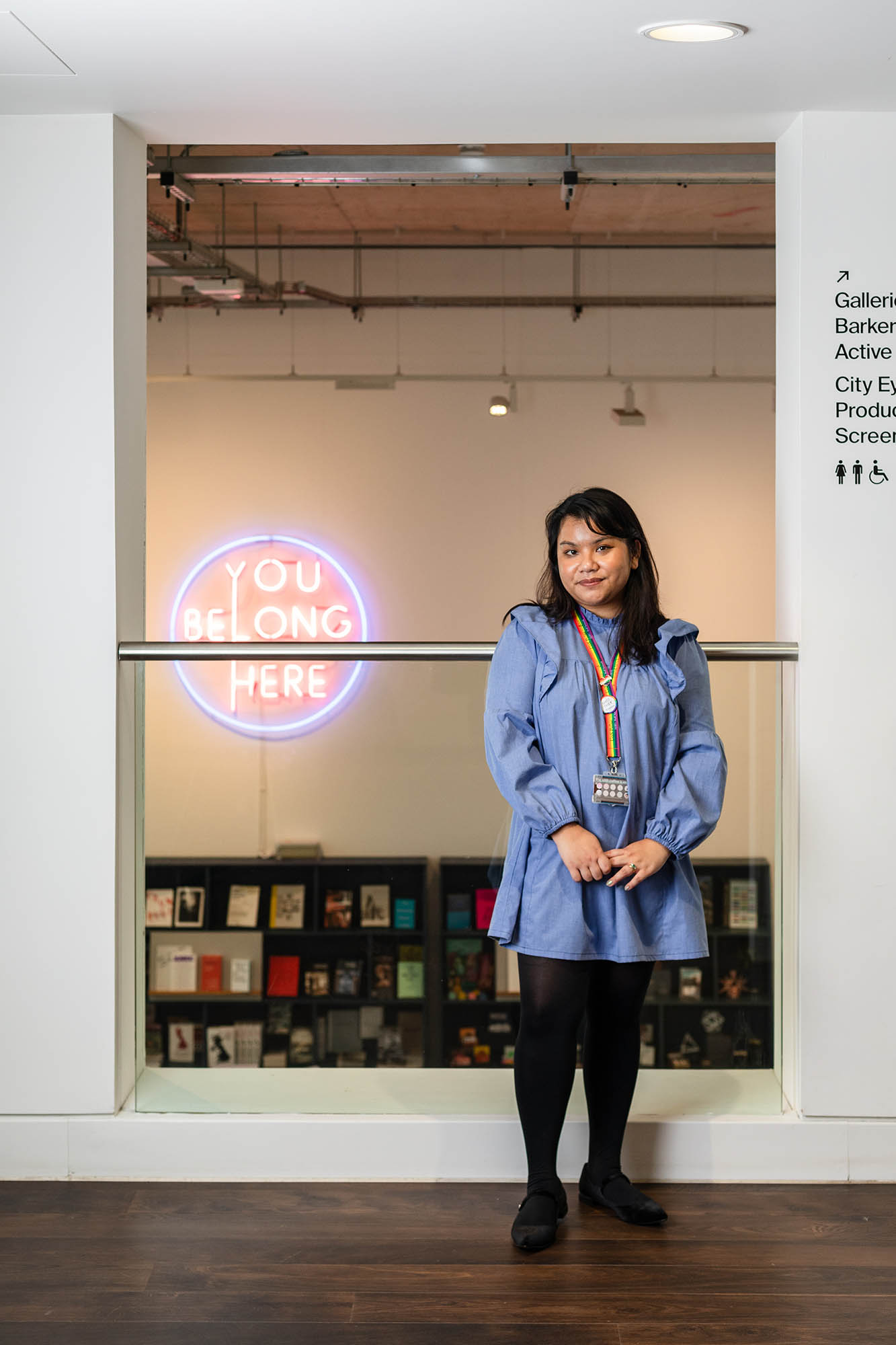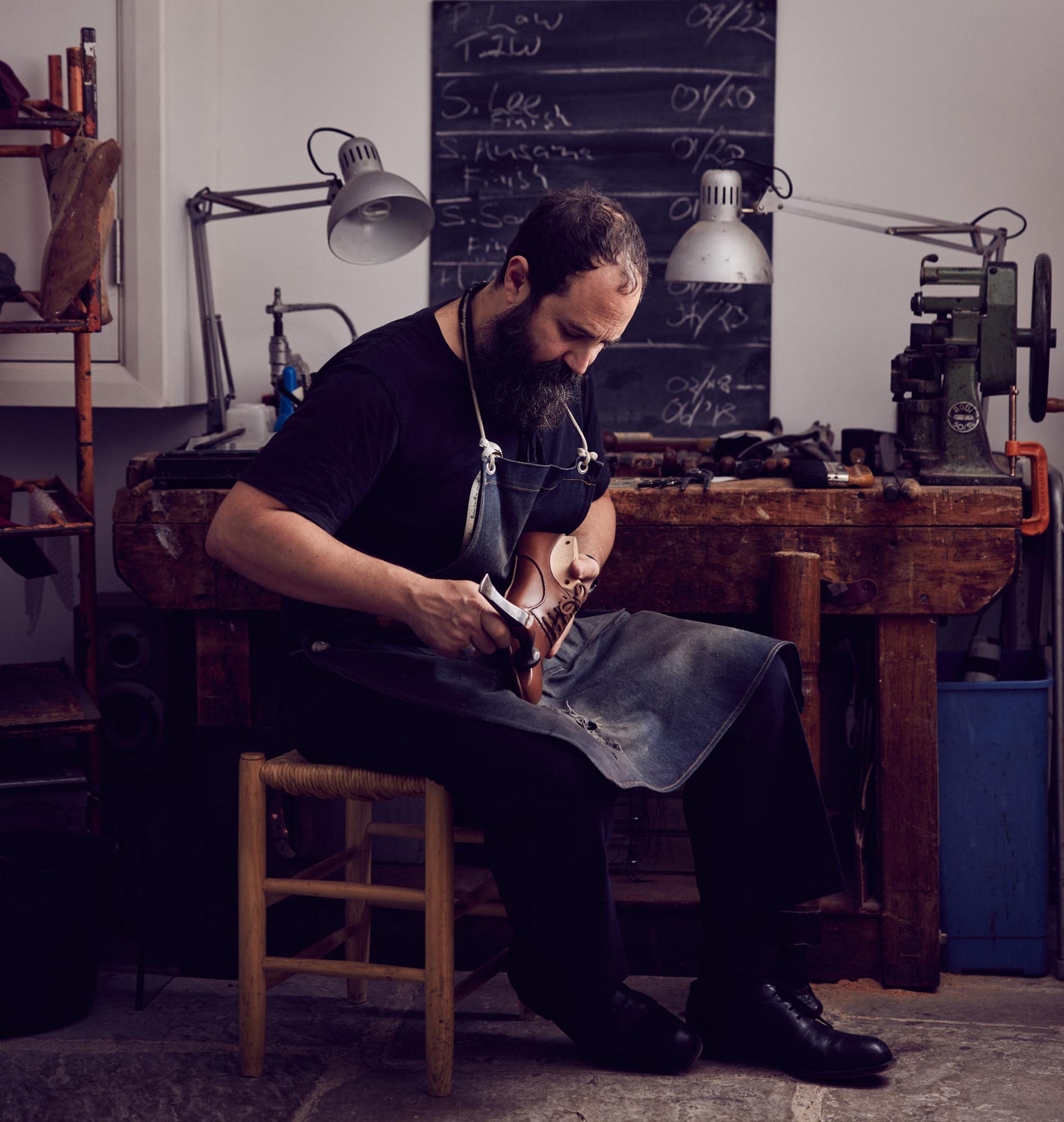
Words by Fiona Thompson
Photography © Jayne Lloyd
Degree apprenticeships: the road less travelled
“When I was young, I dreamed of being a savvy tech genius like Tony Stark, the lead character in the Iron Man films,” says Hassan Kone. “I particularly enjoyed the relationship he had with his AI assistant, Jarvis, who acted as his mentor and friend, helping him get out of all kinds of tricky situations.”
During his early teens, an entrepreneurial streak together with his interest in technology inspired Hassan to launch his own social media channels, and he now has over 300,000 followers on Tik Tok and Instagram.
“They’re mostly videos about football, but I’ve also branched out into working with brands. I worked on a BBC show for a short film that parodied The Apprentice,” he says.
“I’m delighted that my job now allows me to pursue my love of technology,” he continues. “In a way, it ties in with my original passion for Jarvis, as I’m currently working on generative artificial intelligence projects.”
Hassan recently took up a position as an Information Technology Associate at Accenture, as part of a degree apprenticeship programme.
He’s studying for a BSc Degree in Digital & Technology Solutions while developing expertise in a range of areas, including digital, web, data, cyber security, cloud computing, project management, application and infrastructure development, and business analysis. The apprenticeship lasts for three years. Hassan studies one day a week at the University of East London, in addition to on-the-job training, structured training and courses.
Launched by the government in 2015, degree apprenticeships enable students to earn while they learn. Typically, people spend 20% of their time on university studies and 80% of their time working for an employer. Around 100 educational institutions currently offer this type of course, working in partnership with employers such as Deloitte, BT, BMW, Lloyds Banking Group, GSK and EDF Energy.
The government and the employer split the cost of the university tuition, allowing people to gain valuable work experience, earn a living and get a degree without building up student debt.
So it’s no surprise that interest in degree apprenticeships is on the rise. According to government apprenticeship figures, 41,340 students started a degree apprenticeship in 2022-2023, which is an increase of 9% on the previous year.
It’s a route that offers many advantages, but does also have its drawbacks. Degree apprenticeships are not widely available, each one has different entry requirements and there’s considerable competition for the places that do exist. In some instances, they’re harder to get into than Oxbridge. Plus, they’re less well understood as a higher education option, both by schools and parents.
“I always knew that I could count on Mr Okey to answer any questions about my career or about my future. The fact that he was right there beside me on my journey gave me the extra confidence I needed.”
Before deciding on a degree apprenticeship, Hassan took advice from friends, family and mentors, all of whom gave him valuable insights into the type of higher education that would suit him best.
His first mentor was Ikechukwu Okey, Assistant Headteacher at Prendergast Ladywell School, one of the Leathersellers’ Federation of Schools in South London. “I always knew that I could count on Mr Okey to answer any questions about my career or about my future,” says Hassan. “The fact that he was right there beside me on my journey gave me the extra confidence I needed.”
Ikechukwu adds: “The support we offer at the school encourages young people like Hassan to become more career-oriented at a young age. I’m delighted that he achieved the degree apprenticeship at Accenture.
“In general, I’m a big advocate of students from our school going for degree apprenticeships. It means their degree is paid for, they start on a salary at the age of 18 and they don’t saddle themselves with debt. Many of our students come from a background where they already have the odds stacked against them. A degree apprenticeship helps them to overcome deprivation and change the dynamics of their life.”
For his A levels in Maths, Physics and Computer Science, Hassan went to South Bank University Academy (SBUA), near Elephant & Castle in South London.
At SBUA, Hassan found his next mentor, Peter Young, the Head of Sixth Form at the college. “At this stage, my predicted grades were high, but I was having some problems motivating myself,” says Hassan. “Peter helped me assess where I was going and my vision for the future. He said that if I was given the right support, I could achieve great things. Something clicked in my head, and I realised I had to apply myself academically.”
At this point, Hassan was at a crossroads. He was studying for three A levels and faced a serious decision: where, what and how to study next?

Enter his next mentor, Frances Trought, Founder of Everything D&I (EDI), an organisation that works with employers to create opportunities for students from diverse backgrounds with a focus on race, gender and social mobility.
Frances explains: “We strongly believe that there’s talent everywhere and we look for ways to showcase diverse talent to organisations. We enable students to connect with professionals they wouldn’t normally have access to so they can widen their network.
“For example, we partner with companies like Accenture, we run talks at schools to help students understand the benefits of degree apprenticeships, and we support students through the application and interview process.”
Hassan took part in various EDI career programmes, where it was clear that he had a lot to offer. “He came across as confident, but also humble,” says Frances. “He was a great collaborator on team projects, brilliant academically and very self-aware. Hassan was a great inspiration to the other students on the programme.
“You could see he had massive potential. He was the perfect candidate to make the most of the opportunity to apply for a degree apprenticeship.”
Frances shares Ikechukwu’s view that degree apprenticeships are a powerful way to encourage social mobility. Their belief is supported by a recent report by the Chartered Association of Business Schools. It found that almost a third (32%) of business and management apprentices come from communities with low participation rates in higher education.
The report states that: “Apprenticeships reach into communities where higher education engagement is at its lowest, and support new pathways into successful careers. In this context, business apprenticeships, in particular those in leadership and management, play important roles in widening participation on multiple measures and are key to the levelling up agenda.”
However, a common barrier for students is schools’ lack of understanding of this route into higher education.
“Schools know how to prepare students for university,” says Frances. “They know about the UCAS system, about personal statements and how to guide students in selecting universities. But there’s much less awareness of degree apprenticeships in schools and the selection process, although this is improving. Careers staff may know that they exist, but need support from employers to understand what’s required to compete. Some companies will only have 20 or 30 degree apprenticeships available, so it’s highly competitive. There are far more students than places.”
The UCAS system for university degrees is also straightforward in comparison. For degree apprenticeships, some applications open in September, some in October, others in February or June.
“If you’re a student in Year 13 doing your A levels, it can be quite daunting to monitor all those dates, write multiple applications to companies and then take part in the interview and assessment process too,” says Frances.
Typically, applicants for degree apprenticeships have to undertake a range of tests in order to secure their place. Once their initial application has been accepted, they are likely to be asked to attend an assessment centre where they will carry out written tests, take part in a panel interview, give a presentation and work on a group task with other applicants.
“My family will always be really important to me, but it means a lot to have had support from people outside the family too. When people like Mr Okey, Mr Young and Frances put so much trust in you, it’s really motivating and inspirational.”
It can be an intimidating process that can easily trip students up, if they don’t have the right preparation and guidance.
Frances says: “For the young people we support, this is often the first time they’ve had to think about this kind of multi-level process. So we provide guidance in a variety of ways, from helping them reflect on their skills to discussing how to play to their strengths when they’re at an assessment centre.”
She compares the role of EDI mentors to sports coaches who shout encouragement from the side lines. “We know that the candidate has talent. We’re here to help them reach their full potential, while making sure they stay on course.
“If they don’t have someone at school or family members who can guide them, how will they know how to navigate the process?”
Meanwhile, Hassan’s parents preferred the idea of him pursuing a traditional degree course. His father has a senior role as an economist, while his mother is currently completing a PhD in economics. Having followed more conventional routes themselves, they wanted Hassan to do the same.
Frances comments that: “Culturally, if you’re from a Black or Asian heritage, you’re often told from a young age that you’re going to university. That’s the path and that’s the goal. It’s a crowning moment for the family to be able to say that their child has graduated in a certain subject from a particular university.
“Apprenticeships in the past have had a bad reputation, so we sometimes have to explain the benefits of degree apprenticeships to parents so they can accept this may actually be a better option for their child.”
Hassan agrees that it was helpful to be able to share EDI’s view of degree apprenticeships with his parents, and says that they are now “totally on board” with the idea.
He followed Frances’ advice to apply for a degree apprenticeship with Accenture and acknowledges that: “She had a huge influence on me and I really respect her for that. In the past, I’ve struggled with interviews and Frances guided me through what I needed to do, how to calm down and cope under pressure. She helped me understand how to answer the questions and to be my natural self, rather than trying to be someone I’m not.

“Now that I’m at Accenture, that approach has helped me to thrive. They look for people who are unique, who have something different to offer, and Frances’ mentoring helped me to be true to myself.”
He explains the role that mentors have played in his educational journey. “My family will always be really important to me, but it means a lot to have had support from people outside the family too. When people like Mr Okey, Mr Young and Frances put so much trust in you, it’s really motivating and inspirational.”
It’s difficult to overstate the importance of mentors when it comes to social mobility, and the support of employers is equally vital.
Frances adds: “Accenture don’t just talk social mobility; they live it. They have a really good support programme for students and look for different ways to help students from diverse backgrounds to navigate the process.”
One way they do this is to give students who are already on the course the opportunity to talk to students who are applying. “This means that people see people who look like them, from similar backgrounds, so applicants think ‘I can do this’. There’s that aspirational factor,” says Frances.
As for Hassan, he’s got his eyes firmly fixed on the future. “I’ve been at Accenture for six months already and I’ve honestly enjoyed every moment of it so far,” he says. “Everyone at the company is so supportive and there’s a real sense of togetherness. It helps that one of my friends from SBUA is on the same programme.
“I joined the company’s football club where we play other teams within the company as part of a football league. But one of the best things is Accenture’s offices. They look amazing and give you the feeling you’re literally in [the tv programme] Suits.
“My main goal for the future is to climb up the ranks as quickly as possible and try to make a major impact in the tech field through Accenture.”
Thanks to his talents and a supportive ecosystem of friends, family and mentors, Hassan’s in a really good position to do just that.
Read Next

Breaking Through the Class Ceiling
What can a photographic exhibition at Southampton University teach us about social mobility? Students, staff and alumni share their experiences and contribute to a complex, intersectional picture of challenges.

Behind the Wheel
Cars and leather have gone together since the birth of the automobile and, though the industry is pivoting towards electric vehicles, it remains convinced of the sustainability, luxury, and durability of genuine hide interiors.

The Embers of Shoemaking in East London
East London shoemakers are rekindling embers of the area's historic craft. Elisa Anniss meets the artisans making it happen.